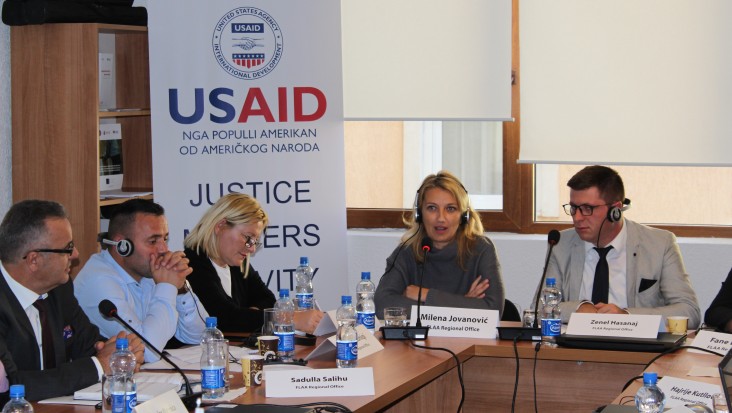Speeches Shim

Justice Matters is a three-year activity to improve access to justice for all, inclusive of disadvantaged and marginalized groups, by strengthening the institutions, actors, and processes for providing legal aid services and legal information. Through this activity, USAID aims to:
Strengthening the Capacity of Kosovo's Legal Aid System
USAID through the Justice Matters activity aims to strengthen the capacity of Kosovo’s legal aid system in a manner that is holistic and sustainable. Our interventions will improve financial management, develop the institutional capacity of the Legal Aid Council and Free Legal Aid Agency (FLAA), enable provider accreditation and mobilization, and facilitate inter-institutional coordination.
Enhance the Quality and Responsivness of Legal Aid Service
The Justice Matters activity focuses on the supply of legal aid services to enhance their availability, quality, and responsiveness to the justice needs of communities. Our interventions will develop a coordinated needs assessment methodology; integrate legal aid work into law school curriculum through live clinics; increase access to services across Kosovo; and increase the professionalism of legal aid practitioners. The quantity and quality of legal aid will increase, connecting a network of providers and law students to expand FLAA reach and tailoring services to meet the specific needs of communities, including women, minorities, and other vulnerable groups.
Strengthen Legal Literacy and Citizens Empowerment
Specifically, the Justice Matters Activity will focus on increasing informed demand for legal aid services by improving legal literacy and empowering citizens, especially vulnerable groups. Interventions will provide actionable legal information to communities and vulnerable groups, leveraging existing informational platforms and activating a network of civil society organizations (CSOs), grassroots organizations, and young people to deliver information. In addition, interventions will support coalition building to conduct effective budget advocacy on behalf of the legal aid system. Citizens will have access to concrete information on their legal rights, enabling them to seek enforcement of those rights in the justice system, and CSOs will coalesce to support advocacy for increased resources for the legal aid system.
KEY RESULTS
- The number of low-income and marginalized communities who received legal aid or victim’s assistance increased 64 percent through the support to First Response Hubs established in partnership with local CSOs.
- Increased legal literacy through 79 advocacy and outreach initiatives, in a variety of in-person, online, and television mediums, such as information sessions with low-income citizens, women, Roma, Ashkali, Egyptian, and LGBTI communities; television programming addressing marginalized communities; online videos highlighting students’ engagement in the community; and promotion of pro-bono culture among lawyers.
- FLAA regional offices trained to address emerging trends and needs in legal aid, training needs for legal officers, case intake guidelines, and online service provision during office closures due to COVID-19.
- FLAA financial personnel mentored and trained in needs-based budgeting for the Agency’s annual budget request to the Ministry of Finance. Budget mentoring and training has resulted in a 20 percent increase in budget allocation to the agency.
- Four CSO grantees developed and disseminated outreach and advocacy materials targeting vulnerable communities, including the development of mobile apps to connect women and the LGBTI communities to legal information and resources remotely.
- 302 students took part in live legal clinics at universities in Kosovo that included standardized curricula, site visits to justice institutions and legal education outreach events, all emphasizing practical skills for legal professionals as well as exposure to legal aid career paths. 40 percent of these clinic students participated in Justice Matters organized outreach or legal assistance events.
- 98.6 percent of legal aid recipients reported satisfaction with services and support received from the FLAA and legal officers.
- 71 interns placed in a broad range of partner organizations including with CSO members of the Equal Rights for All Coalition, FLAA regional offices, the Kosovo Bar Association, the Ombudsperson Institution, partner universities, and with USAID Justice Matters activity office.
Project Duration: June 2018 – June 2021
Partner: National Center for State Courts [ NCSC] .
Contact: Perihan Ymeri Ustaibo

Comment
Make a general inquiry or suggest an improvement.